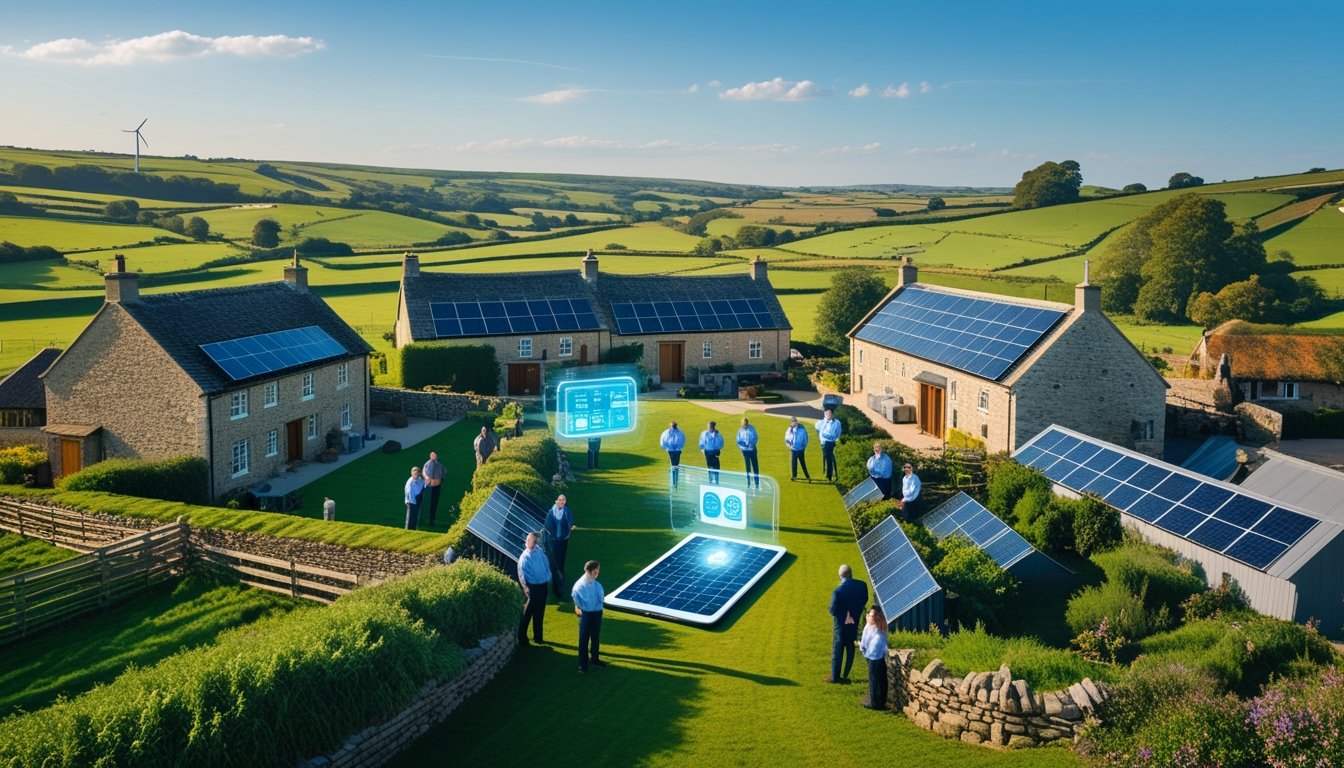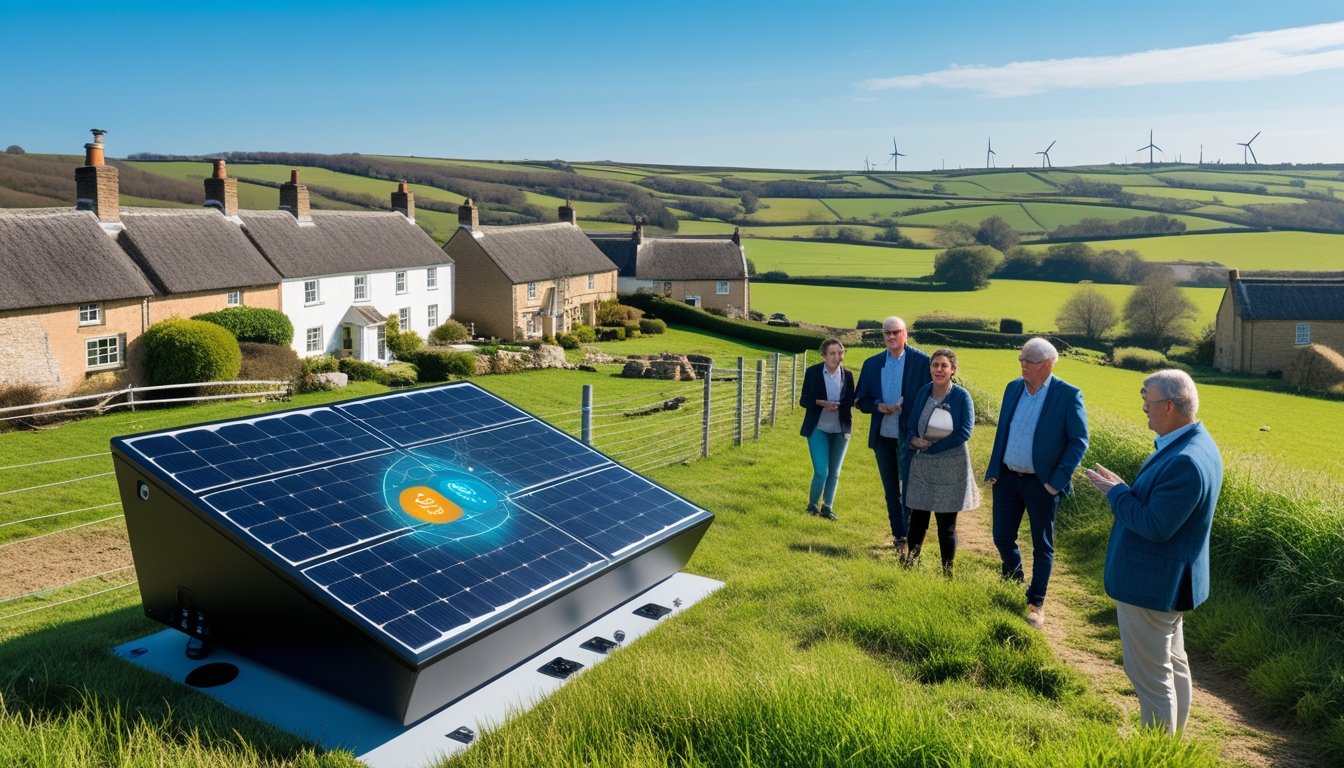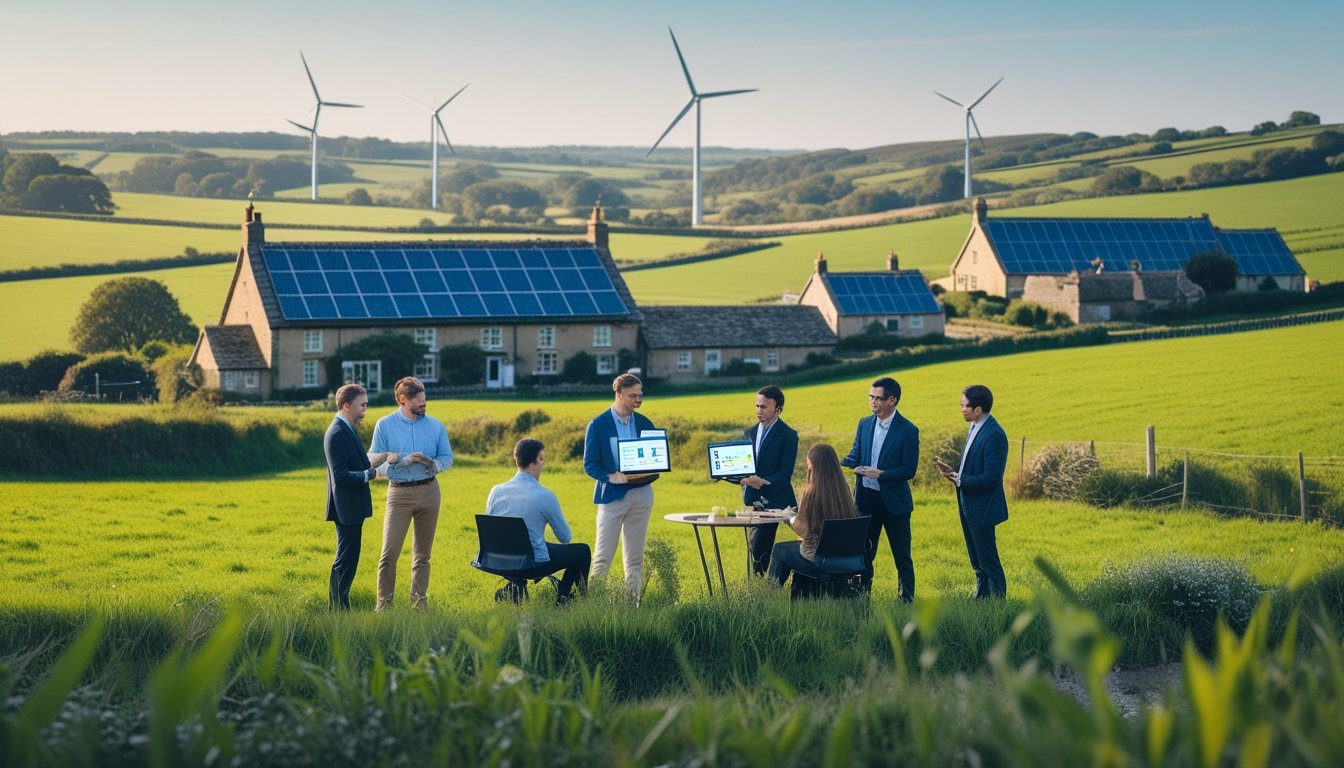Late updated: 04 Jul 2025 09:07
Written by: Oliver Bennett
Innovative AI Solutions For UK Rural Energy Efficiency: Transforming Sustainable Practices
In the heart of the UK's rural regions, artificial intelligence is revolutionising energy efficiency. These breakthroughs are more than just technological advancements; they represent a pivotal shift towards achieving net zero targets by 2050. Through the integration of AI with local energy systems, we are witnessing a transformation in how these communities harness, manage, and sustain their energy needs.

Our journey through these rural innovations showcases a blend of AI technology and environmental stewardship. By incorporating AI-driven solutions like predictive modelling and automated systems, we enhance not just the efficiency but also the sustainability of energy consumption. This dual benefit reinforces the rural areas' roles in the broader national agenda for clean energy.
As we delve further into this topic, we explore how these innovative adaptations serve as a blueprint for global strategies in clean energy transitions. By bringing to light the real-world applications and successes, we aim to inspire further dialogue and development in using AI for environmental progress.
Key Takeaways
- AI is reshaping rural UK energy practices.
- Efficiency and sustainability gain from AI integration.
- Rural efforts reflect global clean energy goals.
Transforming Rural UK Energy Efficiency with Innovative AI Solutions

In the rural areas of the UK, artificial intelligence is revolutionising energy management. By leveraging AI technologies, we can boost energy efficiency, optimise resource usage, and empower both consumers and public services to adopt cleaner energy solutions.
AI-Driven Energy Optimisation in Rural Communities
AI-driven technologies are transforming the way rural communities manage energy consumption. By analysing energy usage patterns, AI solutions offer precise energy optimisation, helping us to reduce wastage and improve efficiency. These technologies can dynamically adjust energy settings in homes and businesses based on actual usage, ensuring more efficient energy distribution.
With AI innovations at the forefront, rural settings benefit from improved resource management. Renewable energy sources, such as wind and solar, are optimised through AI algorithms that predict energy demand and supply fluctuations. By integrating these AI-driven strategies, communities can significantly cut energy costs and enhance sustainability.
Enhancing Smart Grids and Grid Management
Incorporating AI into smart grid systems in rural areas ushers in new possibilities for grid management. AI solutions enable real-time monitoring and management of energy flows, increasing grid efficiency and resilience against faults. These technologies facilitate seamless incorporation of renewable energy into the grid, a critical advancement for achieving energy sustainability.
AI-driven analytics allow for precise demand response mechanisms, optimising the match between energy supply and demand. This helps us prevent energy shortages or surpluses, balancing energy distribution across the grid. Additionally, smart grids equipped with AI can dynamically allocate energy resources, maximising the use of renewable energy while ensuring reliability.
Predictive Maintenance and Operational Efficiencies
AI technologies are central to predictive maintenance, which anticipates equipment failures before they occur. By collecting and analysing data from various grid components, AI can predict potential faults, reducing downtime and maintenance costs. This proactive approach ensures we maintain seamless energy services and enhance operational efficiencies.
In rural energy systems, predictive maintenance is crucial for minimising disruptions. AI solutions alert operators about necessary maintenance activities, avoiding unexpected breakdowns. Through enhanced energy management, rural communities can rely on consistent energy supply, which is pivotal for both daily operations and emergency readiness.
Empowering Consumers and Public Services
AI innovations empower consumers in rural UK through personalised energy management solutions. These technologies provide consumers with insights into their energy consumption patterns, enabling them to make informed decisions to optimise usage and cut costs. AI-driven tools include smart meters and user-friendly apps that track energy consumption in real-time.
Public services also benefit significantly from AI integration. Improved energy management systems facilitate better allocation of resources for public utilities, like street lighting and water services. By embracing AI-driven energy solutions, public services can operate more efficiently and sustainably, marking a substantial step forward in meeting the energy demands of rural communities.
Driving Sustainability and the Clean Energy Transition
In the UK, the shift towards a sustainable future is powered by innovative solutions that harness clean energy technologies and artificial intelligence. We look at how these advancements are reducing carbon emissions, integrating renewable systems, and stimulating economic growth.
Reducing Carbon Emissions and Environmental Impact
Reducing carbon emissions is key to achieving net-zero targets. Utilising AI in energy management allows us to better predict and optimise energy usage, minimising waste and enhancing the efficiency of low-carbon technologies.
Clean energy solutions, such as solar panels and wind farms, are increasingly integrated into our energy systems. Through strategic planning and the adoption of AI, we can better monitor and manage these resources, reducing the carbon footprint and supporting climate goals.
Integrating Renewable Energy and Energy Storage Systems
Integrating renewable energy with effective storage systems is vital for a sustainable energy future. The UK's advancements in battery technology and the application of AI in energy projects are pivotal in enhancing the reliability of energy supply.
Small modular reactors and innovative energy storage solutions are contributing to this energy transition. By ensuring that energy is stored and utilised efficiently, we maximise the potential of clean power and move closer to being a clean energy superpower.
Economic Growth Through AI-Led Innovation
AI's role in the clean energy sector extends beyond environmental benefits; it also drives economic growth. The Net Zero Innovation Portfolio funds projects that leverage AI for efficient energy solutions, leading to job creation and technology advancements.
Increased investments in AI data centres and smart energy systems highlight the significant economic potential. These ventures not only reduce energy costs for consumers but also position the UK as a leader in the renewable energy sector, showcasing our commitment to a sustainable future.
Frequently Asked Questions

In rural areas across the UK, artificial intelligence is emerging as a powerful tool to enhance energy efficiency, integrate renewables, and optimise usage patterns. With increasing interest in these innovations, several questions frequently arise regarding their implementation and effectiveness.
How can artificial intelligence reduce energy consumption in UK rural areas?
AI systems can identify patterns in energy use, allowing for more efficient resource distribution. By analysing data, AI can forecast peak demand periods and suggest strategies to minimise consumption. Furthermore, smart grids empowered by AI can enable a better balance between demand and supply by dynamically adjusting energy flow.
What are the most effective AI-driven technologies for managing energy efficiency in rural communities?
Smart meters and AI-based data analytics platforms are among the most effective technologies. These tools help in monitoring real-time usage and providing actionable insights for residents and providers. Weather-predictive models powered by machine learning also aid in optimising renewable energy deployment and ensuring efficient energy management.
In what ways are rural energy providers utilising machine learning to predict and optimise energy usage?
Machine learning algorithms are being deployed to predict future energy needs based on historical data and environmental conditions. This predictive capability enables providers to optimise energy distribution, reduce waste, and improve overall grid reliability. Providers are also utilising these insights to plan maintenance activities more effectively.
What are the barriers to adopting AI solutions in the rural energy sector and how can they be overcome?
Barriers include high initial costs, limited infrastructure, and a skills gap in AI technologies. These can be overcome by increasing subsidies, investing in rural tech infrastructure, and providing training programmes. Collaboration between the government and private sector can also facilitate a smoother transition to AI-based systems.
Can AI effectively integrate renewable energy sources into rural energy grids, and if so, how?
AI can integrate renewable energy sources by optimising grid operations through advanced algorithms. These systems predict energy output from sources like wind and solar, ensuring a steady supply. AI can also assist in balancing intermittent renewable supply with energy storage solutions, enhancing grid stability and resilience.
What funding opportunities are available for deploying AI-enhanced energy efficiency projects in the UK countryside?
Various government schemes and private funding opportunities support AI initiatives in rural energy. Programmes like the UK's AI Growth Zones and grants from innovation funds provide financial assistance. Collaboration with academic institutions can also unlock additional resources and expertise for these impactful projects.
